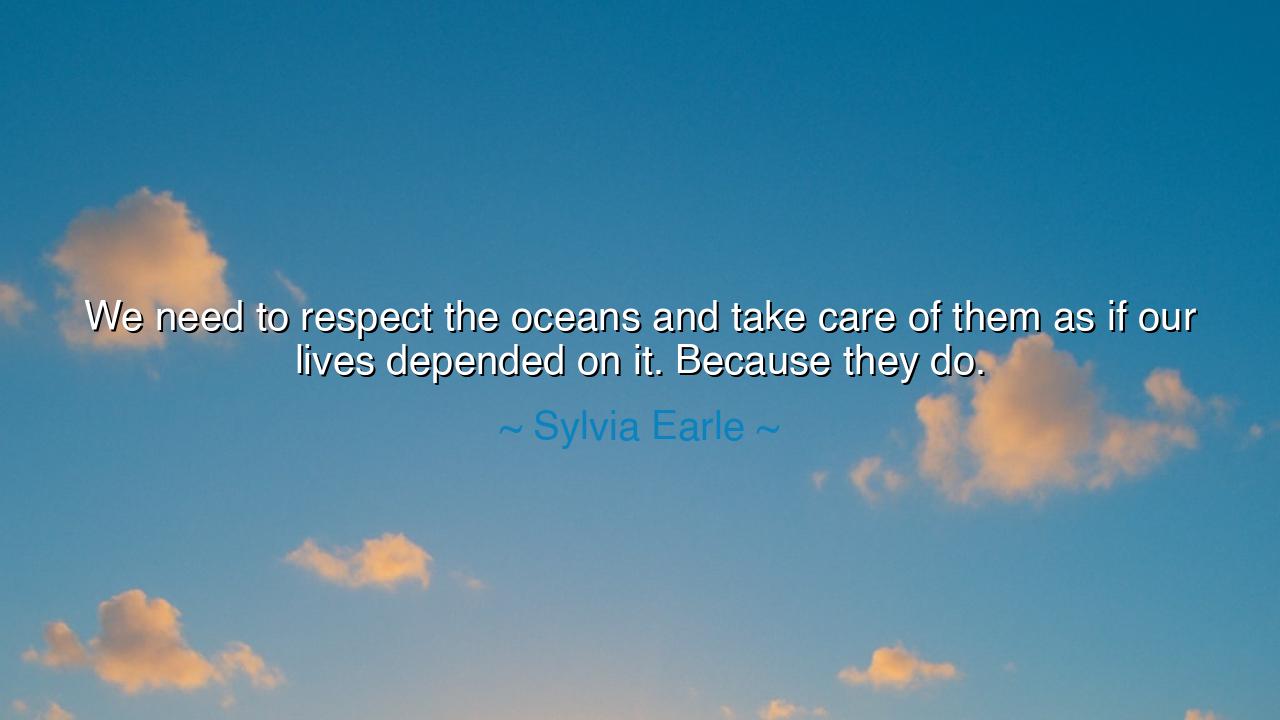
We need to respect the oceans and take care of them as if our
We need to respect the oceans and take care of them as if our lives depended on it. Because they do.






“We need to respect the oceans and take care of them as if our lives depended on it. Because they do.” Thus proclaims Sylvia Earle, explorer of the deep, guardian of the seas, and prophet of the blue wilderness. In her words lies a truth older than mankind, a truth written in tides and currents: that the ocean is not separate from us, but our very lifeblood. To wound it is to wound ourselves, for without its breath, its abundance, and its balance, life upon the land cannot endure.
The ancients revered the sea with awe and trembling. To the Greeks, Poseidon ruled with trident in hand, both destroyer and giver of bounty. To island peoples, the waves were both pathway and peril, sacred and feared. They did not mistake the ocean for a thing to be owned—it was a god to be honored, a mystery to be respected. Earle, though clothed in the garments of science, speaks in this same ancient voice. She tells us plainly: the ocean is not ours to conquer, but ours to safeguard, for in its depths lies the beating heart of the earth.
Consider the fate of the cod fisheries of Newfoundland. For centuries, the waters teemed with life, and men believed the harvest endless. But greed and neglect stripped the seas, and in a single generation, a way of life vanished. The ocean had given, and when disrespected, it withdrew its gift. This story is no mere tale of fishermen, but a mirror for all humanity: when we forget that our lives depend on the seas, the seas remind us with silence.
Earle herself has spent her days descending into the unknown, bearing witness to the beauty of coral forests, whale songs, and endless shoals of silver fish. Yet she has also seen their decline—reefs bleached white, waters poisoned, creatures driven toward extinction. Her cry is not one of abstraction, but of testimony. She has looked upon the living ocean and upon its dying, and so she declares: “Respect it, for it sustains you.”
O children of the future, listen to this command. You breathe because the ocean breathes, giving more than half the oxygen of the earth. You eat because the sea feeds multitudes, from great cities to humble villages. You live in a climate tempered by its waters, its currents, its storms. Think not of the ocean as distant, but as the mother whose arms cradle you unseen. If she weakens, so too will you.
The lesson is clear: to honor the ocean is to honor ourselves. To pollute less, to waste less, to consume with reverence, is not a burden but a sacred duty. Each act of care, each voice raised for protection, is a thread in the net that preserves life for generations yet unborn. Let no one say, “It is too vast, what can I do?” For as drops make the tide, so do small acts become great change.
Therefore, let your practice be this: reduce what you waste, protect what you can, support those who labor to heal the seas. Teach your children that the ocean is not a dumping ground, but a temple; not a storehouse without end, but a trust placed in our hands. And let them know that in caring for the ocean, they care for themselves, for their children, and for all life.
So I say unto you: heed Sylvia Earle’s warning. Respect the ocean, for it is the breath of the world. Take care of it, as if your life depends on it—because it does. And if you do, then when your children gaze upon the horizon, they will not see desolation, but the living, eternal sea.






AAdministratorAdministrator
Welcome, honored guests. Please leave a comment, we will respond soon